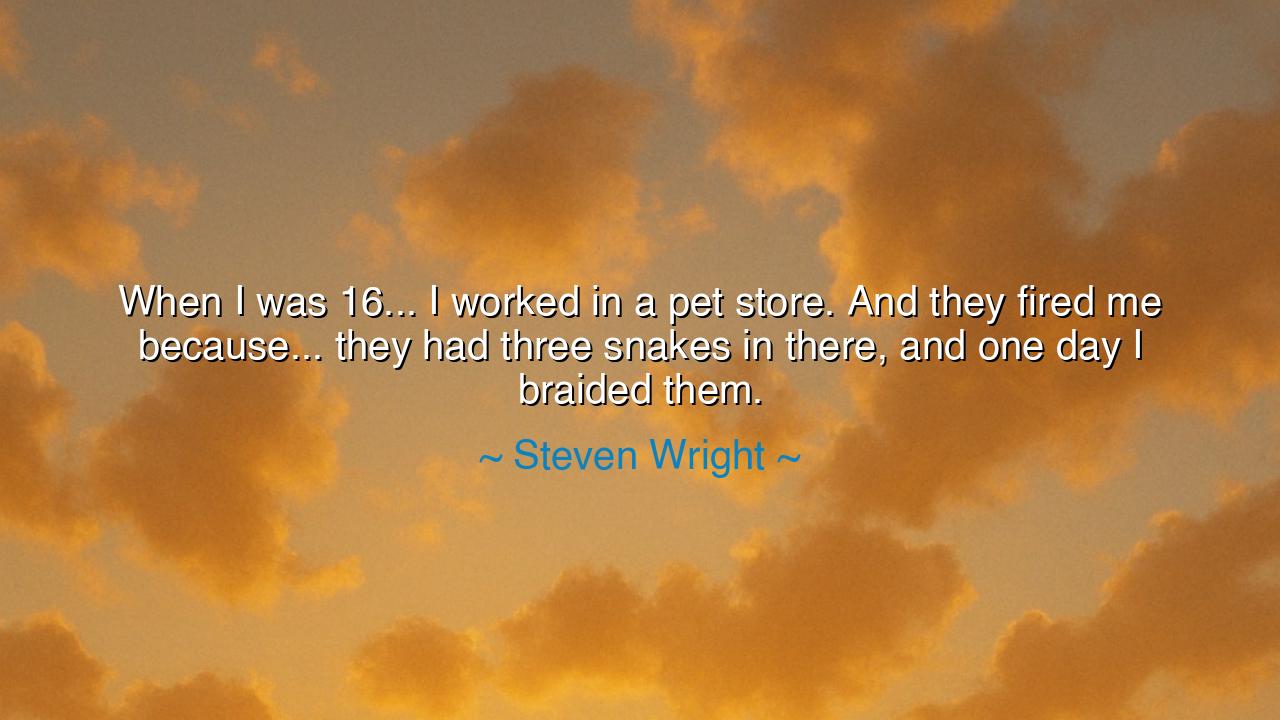
When I was 16... I worked in a pet store. And they fired me
When I was 16... I worked in a pet store. And they fired me because... they had three snakes in there, and one day I braided them.






Steven Wright, the master of dry wit and hidden wisdom, once declared with his peculiar calm: “When I was 16... I worked in a pet store. And they fired me because... they had three snakes in there, and one day I braided them.” At first, his words seem but a jest, a picture painted in absurdity. Yet, like the riddles of the ancients, this humor conceals meaning. For the act of braiding snakes—creatures meant to move free, each in its own winding path—becomes a symbol of how humans often impose order where none belongs, and how the attempt to bind the untamable brings both laughter and consequence.
The ancients would have smiled knowingly at such an image. They, too, told tales of men who tried to master nature with folly. The Greeks spoke of Icarus, who bound wings of wax to his arms to defy the heavens, only to fall when the sun revealed the vanity of his work. To braid snakes is to attempt a similar act: to take what is wild and flowing, and twist it into a pattern of human invention. The laughter it provokes arises because we see both the innocence of the attempt and the inevitability of its failure.
In Wright’s tale, the pet store becomes a stage, and the firing a moral. The store demanded care and order, but the boy of sixteen sought instead to play, to weave chaos into creation. His punishment was swift, yet his story lives on. The meaning is clear: society often rejects those who do not conform to its expectations, even when their acts are harmless expressions of imagination. Thus the braiding of snakes becomes not only an absurd comedy but also a parable of creativity unwelcomed by rigid order.
History echoes this truth. Consider the life of Galileo. He, too, looked at the heavens and chose to see them differently—not as fixed spheres ordained by tradition, but as moving bodies bound by hidden laws. His imagination, like the braiding of snakes, defied the established order. And for this vision, he too was cast out by authority, silenced and punished. Yet in time, the world recognized that what seemed absurd or rebellious was in fact a glimpse of deeper truth. The young clerk who braided snakes is kin to all dreamers who dare twist the expected into something new.
But there is also humility in Wright’s words. His delivery, cloaked in understatement—“they fired me”—reminds us that folly has consequences, that not every act of imagination is without cost. This balance is vital. Creativity must be tempered with wisdom, lest it destroy what it seeks to enliven. To braid snakes is to invite both laughter and danger, for in their nature lies both fascination and fangs. The wise creator must therefore discern where play ends and peril begins.
The lesson we may draw is this: cherish imagination, even when it seems absurd, for it is the seed of all art and discovery. Yet wield it with care, respecting the nature of the things you touch. Do not crush freedom beneath your order, nor abandon wonder in the face of discipline. Rather, let imagination and responsibility walk side by side, as serpents winding together without harm.
Therefore, let Wright’s strange tale echo in your heart. Remember the boy who braided snakes, punished for his folly yet immortal in laughter. See in him the eternal dance of creativity and consequence. Do not fear to be foolish, for folly is often the doorway to wisdom. But temper your folly with respect for life, lest your weaving of wonders become chains. In this balance lies the art of living: to imagine boldly, to laugh freely, and to honor the freedom of all things that move, whether serpent, spirit, or soul.






AAdministratorAdministrator
Welcome, honored guests. Please leave a comment, we will respond soon